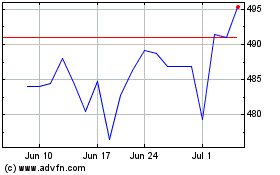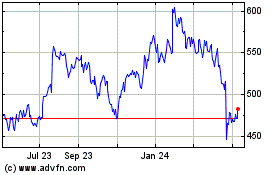Trump's China Blacklist Sparks Reviews at Index Compilers
November 23 2020 - 4:52AM
Dow Jones News
By Frances Yoon
Index compilers FTSE Russell, JPMorgan Chase & Co. and MSCI
Inc. are rethinking their stance on securities from companies that
the U.S. government says help the Chinese military.
On Nov. 12, President Trump signed an executive order barring
Americans from investing in 31 Chinese companies that the U.S. says
supply and otherwise support China's military, intelligence and
security services.
The blacklist sparked a selloff in stocks and bonds issued by
some targeted companies or their units, though analysts said it
wasn't clear if the prohibition extended to publicly traded
subsidiaries as well as to companies named directly by U.S.
authorities. Adding to the uncertainty, the ban is due to start on
Jan. 11, just days before President-elect Joe Biden is due to take
office.
Late last week, MSCI said it was consulting investors on the
impact of the ban, including whether it needed to change existing
stock indexes or introduce new ones.
FTSE Russell, a unit of London Stock Exchange Group PLC, said
its policy was to exclude securities covered by U.S., UK or
European Union sanctions.
The index provider said it was " seeking rapid feedback from
clients and other stakeholders on the scope of the sanctions and
the timing of the deletion of the affected securities from FTSE
Russell indexes." FTSE Russell said it had asked the Treasury
Department's Office of Foreign Assets Control to define the scope
of these sanctions. It plans to reach a decision by Dec. 4.
The overall impact on benchmarks is likely to be modest. Of the
10 biggest stocks in the MSCI China Index, China Mobile is the only
one that would be affected by the ban. It has a market value of
$124 billion, with stock listed in Hong Kong and New York, and
makes up about 1.3% of the MSCI China index.
The order also has implications for corporate bond markets.
Kenneth Ho, head of Asia credit strategy for Goldman Sachs,
estimates that targeted companies and their subsidiaries have about
$53.9 billion in offshore debt, or about 6% of all Chinese bonds
issued in dollars, euros or yen.
FTSE Russell said it was also reviewing the order's impact on
its bond indexes. JPMorgan, another major bond-index provider, said
it wouldn't include new bonds issued by any of these companies in
its benchmarks.
The bank will keep existing bonds in its indexes, but said it
will "re-evaluate once there is more clarity on the impact to
benchmark replication," according to a JPMorgan note published last
week. The note said 16 targets or their subsidiaries had issued
bonds that were included in its indexes, and they make up 3.7% of
the JPMorgan Asia Credit Index, which has about $80 billion in
assets benchmarked against it.
Prices of bonds issued by some of these companies, including
China National Chemical Corp., have fallen since the order. The
company, often known as ChemChina, has borrowed heavily in
international markets in recent years after spending $43 billion to
acquire Switzerland's Syngenta AG.
Owen Gallimore, head of credit strategy at ANZ, said most
international buyers of such Chinese dollar bonds were passive
investors, with their holdings closely tracking a benchmark index.
That meant bonds that were cut off from indexes have a meaningfully
larger spread, or yield premium, versus comparable government debt,
he said.
Write to Frances Yoon at frances.yoon@wsj.com
(END) Dow Jones Newswires
November 23, 2020 04:37 ET (09:37 GMT)
Copyright (c) 2020 Dow Jones & Company, Inc.
MSCI (NYSE:MSCI)
Historical Stock Chart
From Mar 2024 to Apr 2024

MSCI (NYSE:MSCI)
Historical Stock Chart
From Apr 2023 to Apr 2024
